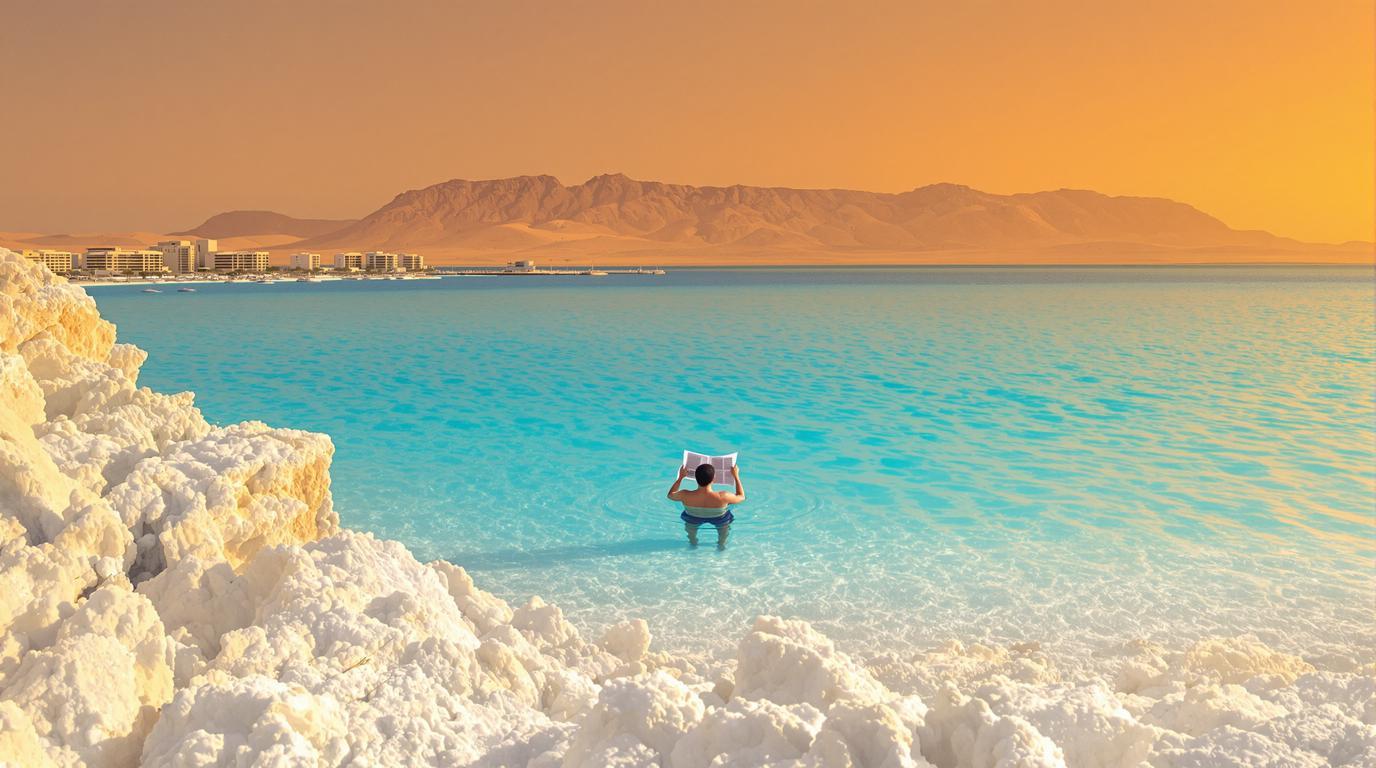The Dead Sea isn’t just any body of water – it’s Earth’s lowest point, sitting 429 meters below sea level where Israel and Jordan meet. This strange, hypersaline lake creates an almost supernatural experience for visitors, where you can read a newspaper while floating effortlessly on its mineral-rich waters.
The healing waters of Ein Bokek
Located at coordinates 31.5012° N, 35.4717° E in Israel’s Southern District, Ein Bokek serves as the Dead Sea’s premier resort area. Unlike the crowded beaches you might find in Egypt’s Red Sea, this area offers a more refined experience with modern hotels lining turquoise shores. The water contains 34% salt – nearly ten times saltier than the ocean – creating the famous floating effect that draws visitors worldwide.
A geological wonder between two nations
The Dead Sea straddles the border between Israel and Jordan, creating a unique political geography. While Ein Bokek represents the developed Israeli side, the Jordanian shores offer a more rugged experience. Local geologist Dr. Amir Hassan explains, “What makes this place truly remarkable isn’t just that you can float – it’s that you’re swimming in a living geological phenomenon that’s dropping by about three feet annually.”
Why March to May is perfect for your visit
The optimal time to experience Ein Bokek falls between March and May, when temperatures hover between a pleasant 20-30°C (68-86°F). The brutal summer heat can exceed 40°C (104°F), making outdoor activities uncomfortable, while spring brings wildflowers to the surrounding desert landscape. September through November offers another excellent window, with warm waters and cooler evenings.
“Spring at the Dead Sea is magical. The light has a golden quality that photographers dream about, and the contrast between the blue water and desert mountains creates scenes that seem almost painted,” shares Leila Farouk, local tour guide.
Beyond floating: hidden experiences
While floating in the Dead Sea tops every visitor’s list, Ein Bokek offers more than just buoyancy. The nearby Bokek Canyon provides a refreshing desert hike through surprising freshwater streams. Unlike the crowded paths of Transylvania’s mountain trails, these paths remain relatively undiscovered by most tourists.
The legendary mud: nature’s spa treatment
The black mud that lines the shores contains a unique combination of 21 minerals, including magnesium, calcium, and potassium. Locals have used this natural resource for centuries, claiming it relieves skin conditions like psoriasis and eczema. Modern spas throughout Ein Bokek now offer elaborate treatments, but nothing beats the authentic experience of applying the mud yourself at public beaches.
Masada: the ancient fortress overlooking blue waters
Just minutes from Ein Bokek stands Masada, an ancient fortification perched dramatically atop a plateau. This UNESCO World Heritage site tells the story of Jewish rebels who chose mass suicide over Roman capture in 73 CE. The sunrise hike up the Snake Path rewards early risers with breathtaking views over the Dead Sea’s azure waters – a vastly different experience than watching the sun rise over the Maldives’ tropical shores.
A disappearing wonder
The Dead Sea is shrinking at an alarming rate of approximately one meter per year. Water diversion from the Jordan River, mineral mining, and climate change threaten this natural wonder. Conservation efforts are underway, but many scientists fear the sea could largely disappear within decades.
“What visitors see today is dramatically different from what I saw as a child,” notes Ibrahim Malham, a 70-year-old Jordanian resident. “The shoreline has retreated hundreds of meters in my lifetime.”
Whether you seek healing waters, extraordinary landscapes, or simply the surreal experience of floating without effort while reading a book, Ein Bokek and the Dead Sea deliver an experience unlike anywhere else on Earth. Just visit soon – like Italy’s hidden pristine beaches, this natural wonder won’t remain unchanged forever.
While tropical paradises may offer warm temperatures year-round, nothing compares to floating in Earth’s most remarkable natural spa as the sun sets behind Jordanian mountains, painting the salt-crusted shores in shades of amber and gold.
